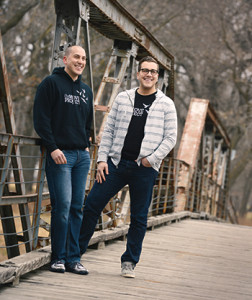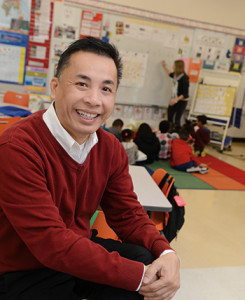
‘The next move is yours’
Written by Jane Schorer Meisner
Photo by Duane Tinkey
Brothers Sam and Nick Mahlstadt—founders of the nonprofit The Move Project—have a passion for helping to eliminate poverty and homelessness, even though they don’t have a lot of spare time.
Sam and his wife, Amanda, of West Des Moines are parents of two young daughters, and they’re expecting twin daughters this summer. Nick and his wife, Typhanie, of Indianola have four biological children and an adopted son. Two adopted daughters from Ghana, West Africa, will join them later this year.
Both men hold full-time jobs, Sam, 28, with Freedom Mortgage Corp. and Nick, 35, with UnitedHealthcare. Still, they believe they can change the world a little bit at a time. And they enlist the help of others with the motto “The next move is yours.”
In 2008, Sam traveled to Ghana to dedicate wells previously built by volunteers from a Central Iowa church. He was surprised to discover that some wells were broken or held hostage by ruthless village chiefs.
“It was really eye-opening for me to realize the problems that go beyond just giving these people a well,” Sam says. “There’s a sense of sustainability and community engagement that wasn’t always there.”
So The Move Project deliberately focuses on long-term involvement, starting with one village in Ghana called Tsipasi. It aims to break the cycle of poverty by first addressing a basic human need: clean water.
“Water, especially in Ghana, is always the first step, because a lack of water isolates a village,” Sam says. “So in 2014, we installed three wells. (In 2015), the focus will be all on building a school in Tsipasi.”
The Move Project works with an attorney and an adviser in Ghana so the brothers don’t have to travel abroad so often. “It’s been really important that we don’t have overhead, so we can fund projects,” Sam says. “But our goal is to get to a place where we can have a staff member or two.”
They don’t even try to avoid becoming emotionally involved, Nick says. “Personally, it keeps me focused,” he says. “When we go over there and see the conditions and experience the people, it just further cements what we’re doing and why we’re doing it.”
The Move Project also has a domestic arm, Sam says. Locally, the brothers have arranged with individuals and hotels to provide toiletries for homeless clients of Central Iowa Shelter & Services. Their connections have been extremely helpful, says the shelter’s executive director, Tony Timm.
“We now have ongoing relationships with hotels that we didn’t previously have, and their support has been instrumental in that,” Timm says, adding that the Mahlstadts are caring individuals who follow through on their goals. “I believe that we will continue to see their passion and commitment through their actions.”
“We take kind of an unconventional approach,” Nick says. “Our opinion is that there are plenty of people involved in homelessness, through advocacy or developing programs for those who are temporarily housed at the shelter. There are plenty of people who are way more educated than we are. What we’re really striving to do is to drive awareness and give people tangible ways to get involved.”
The brothers encourage others to participate in a variety of “Moves,” such as organizing fundraising garage sales or even lemonade stands or collecting canned foods or winter coats. They want others to spread awareness of the efforts and participate in larger fundraising events such as bike rides to finance their projects.
“We’re getting ready to launch a fundraising campaign where people can become charter members of the Tsipasi school,” Sam says.
“It’s important for us to get the word out about what we’re doing,” Nick says. “We strive to spur action.”

Shared Journeys
Written by Barbara Dietrich Boose
Photo by Duane Tinkey
Sipping coffee in a downtown café, Vinh Nguyen expresses genuine appreciation for his students, his colleagues and the fact that his life journey brought him from Saigon, Vietnam, to Iowa’s capital city. But when he contemplates the early years of that journey, he gazes into the distance. His voice quiets. His memories and emotions wrestle visibly across his face.
Born and raised during the Vietnam War, Nguyen (pronounced “nwen”) and his family suffered the economic and political hardships of that nation’s postwar Communist regime. His parents decided in 1981 to smuggle him out, although they and eight of Nguyen’s nine siblings remained behind (one brother had been smuggled out earlier). Nguyen joined others who came to be called the Vietnamese boat people.
“I remember vividly the young women screaming, the yelling, the crying, especially at dusk,” he says, describing the week he spent “sardine-packed” with 134 other refugees on a tiny wooden Thai fishing boat. The desperate passengers, who carried all the money they possessed, were repeatedly robbed and raped by pirates until the boat’s navigator rammed into an oil tanker.
“It’s an experience that I really wish no one would have to live through, but hundreds of thousands of Vietnamese did,” Nguyen says.
Nguyen’s memories are why his work as the supervisor of Des Moines Public Schools’ English Language Learners (ELL) program is driven not by altruism, but by the fact that he’s had similar experiences to those of the students the program serves.
“He understands what it’s like being a refugee and the strength and resilience that requires,” says Jillea Bueso, a teacher in Meredith Middle School’s Intensive English Language Center.
“He’s always trying to learn who our new student groups are and how we can stay current with population needs.”
That population is growing exponentially. The number of ELL students in Des Moines Public Schools has grown from fewer than 1,000 in 1990 to more than 6,000 today, while overall student enrollment has remained stable at around 32,000. They represent more than 100 languages and dialects, from Spanish—the biggest sector, nearly 60 percent—to Arabic (4 percent), Somali (3 percent) and dozens more.
In addition to learning English, these students are coping with a host of other challenges. Immigrant students may fear for their family’s legal status. Refugees may be readjusting from the hardships of resettlement camps. Many must soldier through economic strains as their parents seek employment. And all face trying to fit into a new culture as adolescents. Nguyen strives to help his
colleagues understand these challenges.
“We have so many kids who’ve had no education before they came to us,” he says. “We have so many kids who are born in refugee camps and are seeing an education setting for the first time in their lives. They have a lot going on—education is not the only thing. I always remind them they are very fortunate to receive the education they are now receiving. I also want them to know they have someone who believes in them and their capacity to be successful.”
After his own harrowing weeks in multiple overcrowded United Nations refugee camps in the early 1980s, Nguyen—then 22—flew through six
airports to land in Des Moines, where he was placed with other newly settled Vietnamese men in an apartment at Eighth Street and Forest Avenue. “It was a night I will not forget,” he says with a laugh. “I saw this humongous rat—this big! But it wasn’t a rat; it was a possum. I’d never seen one before. I thought, ‘This is America!’ It was not all that I had imagined, the most advanced country.”
Nguyen, now 53, worked a multitude of low-paying jobs—“everything except meatpacking”—from being a custodian at the Holiday Inn on Sixth Avenue to picking up trash at Adventureland. “I was crying, thinking of myself, ‘Why would you do this?’ ” he recalls. “ ‘You travel half of the globe, watching people enjoying their time at Adventureland, and here you have that little broom and dustpan, collecting trash and cleaning the restroom.’ That was my most discouraging moment.”
“Some days I just wonder how I have done it,” he says. “But my story is not unusual. We have thousands and thousands of refugees who are doing exactly the same thing.”
Fully aware of his vulnerability as a non-English speaker, Nguyen enrolled in night classes at Des Moines Area Community College. He eventually became a language tutor in the Des Moines schools and earned his teaching degree in mathematics at Drake University. After teaching math for several years, he was asked to take on his current role, overseeing a districtwide program with 140 staff members. He also was instrumental in creating the Vietnamese American Community in Iowa and the Iowa Asian Alliance. He’s been honored twice by the Iowa Council for International Understanding for his advocacy for non-English-speaking populations.
Nguyen takes every opportunity to encourage Des Moines to embrace the diversity these populations bring. He points to former Gov. Robert Ray, who
helped Iowa become home to thousands of Asian refugees. He notes that this April 30 will mark the 40th anniversary of the fall of Saigon, just one of countless global events that force people to flee, resettle, seek refuge.
“How are we as a city going to create opportunity for those people to advance themselves? You don’t bring people halfway around the globe to make them a dumpster-diver,” he says. “As a city, we can do better than that. The more we do in education and to enhance the cultural competencies of people, the better it’s going to be for the city. What we do for them today will be paid back 10, 20, 30, 40 years later.”





